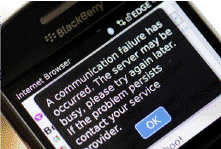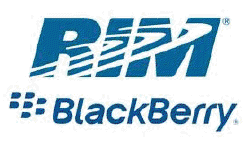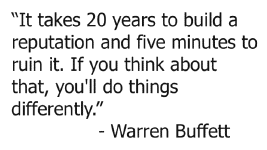Blackberry Blackout—A PR Crisis
I have a Blackberry. And while most of my colleagues, friends, and family have abandoned their “CrackBerries” for the Apple’s iPhone or Motorola’s Droid, I have remained loyal. Maybe because I am in a contract with Verizon until October 2012 or maybe because I am simply attached– addicted to the tiny keys, BBM, and square pad; however after the recent infamous data black out, I am weighing my options. And I am not alone. According to a survey by shopping comparison website Kelkoo, one in five Blackberry users is considering switching to a different smart phone.
Research in Motion (RIM), the Canadian company who introduced the Blackberry ten years ago, is facing one of the biggest PR woes. After the worst Blackberry outage ever– which lasted for four consecutive days, leaving tens of millions of frustrated Blackberry users on five continents without email, instant messaging and browsing— RIM is now trying to make amends by offering $100 worth of free apps, but is this a case of too little, too late?
The PR mishaps and failure to properly communicate along the way have aided in additional frustration and brand damage. During the outage, RIM offered only a few updates on what was happening while a growing number of Blackberry users turned to their social networks to express their increasing anger, using the tag #DearBlackberry. And while it took three days for a public statement to be made from co-CEO Mike Lazaridis– who publically apologized for the outage through a YouTube video— the PR damage was already done.
So what should have RIM done differently to manage this PR and social crisis?
- RIM’s CEO’s should have faced the issue from the beginning, issuing a statement right away. And the delayed YouTube video should have provided a clearer timeline for next steps and updates.
- Social media sites like Facebook and Twitter should have been used to provide fast and helpful responses. RIM only posted 15 updates on Twitter over three days. If they set up their own hash tag, they could have better contributed to the conversation and engaged with their users.
- Be honest and clear. Technical terms like “switch failures” isn’t explaining the situation in simple language. Being more concise and truthful would have better resonated with consumers and gone much further in repairing any relationship damage.
It’s going to be a long road to rebuild Blackberry customer loyalty and the brands’ reputation, especially with the fierce competition of other, better-maneuvered and slicker smart phones. Technology isn’t perfect. There’s always the potential for an outage or breakdown, but it’s about how a brand chooses to deal with the crisis that is crucial to limiting long term reputational damage and lost customers. This PR disaster is a great reminder of how important communication truly is. Acting fast, telling the truth, and controlling the negative conversation are vital.
This a great lesson in bad PR crisis management, but I’d like to hear another recent (we know the Jet Blue story) about a company/brand who took all the right steps in managing a PR crisis. When facing adversity, what did the brand do right? Why was it effective? Please share your thoughts and top tweets of the year with us in the comments below.




